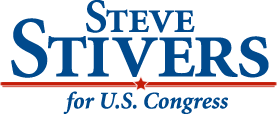BACK TO NEWS
“You can disagree without being disagreeable”: Stivers aims for civility in Congress
05/30/2018By Steven Collins
The Circleville Herald
CIRCLEVILLE— U.S. Congressman Steve Stivers (R-OH) says that he and Democratic Congresswoman Joyce Beatty created the Civility Caucus at the beginning of the year to encourage civil and respectful discourse in Congress and the districts.
“It’s going really well, we now have over 30 members in the caucus,” Stivers said during a stopover in Circleville on Tuesday.
“With all the vitriol and negative rhetoric in politics going on—not just in Washington, D.C., and state capitals—you see it in local communities and family gatherings, Joyce and I wanted people to know you can disagree without being disagreeable and you can try to find common ground and work together. It sets the example that the American people see can work and will work. I’m proud of our work on civility.”
Stivers knows a thing or two about lack of civility. A Westerville man was recently sentenced to three years in prison for threatening to murder Stivers and his family.
“I think the ultimate destination of incivility is violence,” Stivers said. “Why does someone think that is okay and what does that do to our republic and what does that do to people wanting to serve a political life? I think it’s important everybody knows civility is important and it helps us all be more productive, get more things done and find common ground.”
Stivers said the acts of violence all around are evidence that civility is needed now, maybe more than ever.
“We agree on more than we disagree on, but everyone wants to focus on those, say 20 percent, of things we disagree on and ignore the 80 percent we agree on,” he said. “That’s not to say we shouldn’t discuss the things we disagree on, but we need to respect each other’s opinions and not vilify each other, and try to find common ground on the hard things and the easy things. When you do that, you build more trust and get more things done.”
Stivers called President Donald Trump’s behavior “bombastic,” but said his policy changes have been effective.
“None of us will change who the president is; he’s a 72-year-old man and I don’t think he’s not going to change his spots anytime soon,” Stivers said. “The thing I’ve noticed, internationally, with North Korea as an example; they were shooting off missiles every three to four months—we changed our approached and have gone away from appeasement and letting them do whatever they want and moved to a policy of consequential actions—it’s actually brought them to the table.”
Stivers said related the sitautation with North Korea to that of a small child.
“Any parent who has a young child knows what that’s what a toddler is like, they test boundaries,” he said. “That’s what North Korea is like. They’re testing boundaries. When you give them boundaries, they respect them. They’re not going to be sending missiles into the sea of Japan, over Japan, over South Korea and towards the United States. I think that is a result of the change in policy.”
Stivers said even if he may not like President Trump’s tone, he believes the president’s policies are working to make change.
“We need to focus on the policies,” Stivers said. “I believe that tone is important and I obviously can’t change everybody, but I’m trying to set the best example I can on tone, but acknowledge the policies we have are working.”
While in Circleville, Stivers also discussed jobs, net neutrality, and the Farm Bill, which is being reworked after being voted down last week by a vote of 213 to 198.
“I voted for the Farm Bill and it failed, but we’ve got a few extra days to keep working on it,” Stivers said. “I think we’ll get it done. The irony of the Farm Bill failing had nothing to do with the Farm Bill. We had about 30 Republicans vote against it; 16 voted against because they wanted an immigration vote. There also were some people who felt the work requirements were too much for them in their areas.”
Stivers said asking people to work when unemployment is as low as it is, except for those who are exempt, is a good thing.
“I think we need more people to go back to work,” he said. “Instead of having a benefit cliff like we have today, like a lot of government programs, where if you make $1 more your assistance goes to zero; I’d rather turn it into a ramp and you get a job that you do okay but not great…you probably still need a lot of help. I think there’s a way to get people back into the workforce, which is a more important issue because our employers need more people in the workforce and, frankly, nothing is better for people’s self-sufficiency than a job. The only cure for poverty is a job.”
Stivers also touched on net neutrality and the bill he’s presenting in the House of Representatives.
“Net neutrality as most people define it includes three things, throttling (slowing down of internet service speeds despite the speeds a customer pays for) and blocking of websites that are not illegal, blocking and paid prioritization,” he said. “My bill deals with throttling and blocking and makes them both illegal.”
Stivers said on the third issue, paid prioritization, he wants to make sure that’s available unless it’s abused.
“We decided to leave it out of our bill,” he said. “If Netflix wants to pay Comcast to speed up the signal for everyone who is a Netflix subscriber and they want to pay for it, under the old net neutrality, they weren’t allowed to do it. I believe they should be allowed to do it and we should try it for a little while to see if there are any abuses to it.”
Stivers said paid prioritization will lead to good things for the consumer and equated it to going to the convenience store for milk versus going to a grocery store that’s less convenient. He did say he’d be open to reevaluating it, should it be abused.
“Paid prioritization will lead to more investment into internet infrastructure and will also give more value to consumers,” Stivers said. “I think that’s why we didn’t include it in our bill. It’s hard for me to believe that someone wants to make your signal better and faster, and you don’t have to pay for it, that it’s bad for you.”
Stivers said there were huge consequences in his bill for companies who are caught throttling or blocking the internet.
“Those consequences include huge fines and it’s written in a way they’ll pay such a big price they probably won’t be in business much longer,” he said. “As long as blocking and throttling are illegal, it’s not like they can slow you down on one site and speed up another. That would be wrong.”
Stivers also shared they’re working on having the national veterans memorial and museum in Columbus, noting it’s an eight-hour drive to 50 percent of the United States population.
“It’s a really great way to get more people to see and experience veterans through every area and every war; there’s no one museum that’s focused on all veterans,” he said. “That’s something the Ohio delegation worked on last year and the Senate finally got to it. They’ve hotlined it and we think in the next three weeks, it’ll be passed.”
Stivers also talked about a series of legislation aimed at helping veterans, including a dog therapy bill and a bill to aid veterans in getting what they need when they transition out of the military.
“The Veterans Service doesn’t have advance notice when a veteran is coming home,” Stivers said. “We’ve got to figure out how to get [Veterans Service Offices] that information in a meaningful way. We need to get them the help and information they need when they come home from their service.”
Stivers said he and the other congressmen are working on intellectual property laws. He said the United States now ranks 12 in the world, down from the top spot previously.
“America’s never going to have the lowest number of regulations, the lowest wages, but if we have the best intellectual property and protect it, we can have an economy that is second to none,” he said. “We’ve got to fix the laws, and my bill does a few things—it puts the patent system and court system on the same standard and it brings back restraining orders for protection of people who are stealing your intellectual property.”




